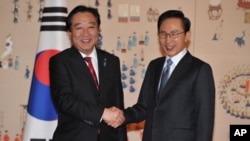The leaders of the Japanese and South Korean governments are vowing cooperation on North Korea's illegal nuclear weapons program and other matters involving the communist state. Japan's prime minister is on his first visit to Seoul since taking office early last month.
Japan and South Korea say they are looking to forge a closer relationship, especially in view of common challenges from North Korea.
In Seoul Wednesday, visiting Japanese Prime Minister Yoshihiko Noda and South Korean President Lee Myung-bak pledged to work together to try to end North Korea's nuclear development.
They also agreed to help each other fully ascertain the fate of their citizens believed to have been abducted by North Korean agents. Scores of Japanese and hundreds of South Koreans are thought to have been kidnapped to provide language and cultural training to Pyongyang's spies.
Although neighbors and sharing military alliances with the United States, the direct relationship between Tokyo and Seoul remains delicate because of Japan's brutal occupation of the Korean peninsula in the early 20th century.
During his meeting with Prime Minister Noda, the South Korean president said close cooperation is vital.
Lee notes the regional security and diplomatic ties between Seoul and Tokyo and says they need to continue into the future.
However, the South Korean president cautions history should not be forgotten and Japan has to do more to resolve the past.
At a joint news conference, Noda pledged to improve relations. But there was no repetition of an apology for Japan's colonial rule, as was uttered by his immediate predecessor, Naoto Kan.
The Japanese prime minister says the difficult problems the two countries face from time to time are regrettable, but, overall in the medium to long term, a cooperative relationship is in place. With the South Korean president, Noda says he would like to keep endeavoring to strengthen the relationship.
Noda did make symbolic gestures to repair old wounds during his 18-hour trip. He flew to Seoul with five out of the 1,205 volumes of a treasured series of ancient Korean royal records taken from the peninsula during its occupation by Japan. Officials here say the Japanese leader promised to eventually return the rest of the books. Noda also placed a wreath at a monument to honor South Korea's war dead.
Japanese officials say the territorial dispute about an island controlled by South Korea for decades but claimed by Japan was not raised in Wednesday's talks. Also not discussed was the issue of compensation for Korean women who say they were forced into sexual slavery by Japanese Imperial Army forces before the end of World War II.
The two countries did agree to resume negotiations on a free-trade agreement and to bolster currency swaps.
The trade talks began eight years ago, but have stalled because of disagreements about agriculture and fish.
The Bank of Korea says the the won-yen swap line will be boosted by three billion dollars to a total of $30 billion, while a new $30 billion U.S. dollar-local currency arrangement will also be opened. This is meant to try to ensure regional financial stability amid concerns about the global economy.
The news drove the South Korean won to a one-month high against the dollar.
However, reports quoting a South Korean government official say Seoul rejected Tokyo's request for an open swap line.
That apparently was seen as an unnecessary step, because South Korea has never utilized the won-yen swap and has ample dollar reserves. But the fund would allow South Korea, during a monetary crisis, to swap its currency for Japanese yen, one of the three global currencies.




